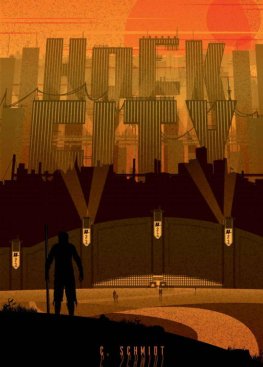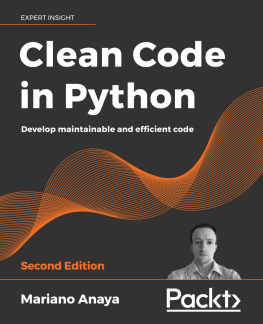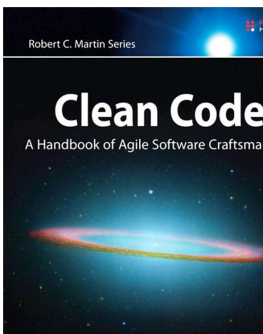Martin Hock - Clean Code Fundamentals
Here you can read online Martin Hock - Clean Code Fundamentals full text of the book (entire story) in english for free. Download pdf and epub, get meaning, cover and reviews about this ebook. year: 2020, publisher: leanpub.com, genre: Computer. Description of the work, (preface) as well as reviews are available. Best literature library LitArk.com created for fans of good reading and offers a wide selection of genres:
Romance novel
Science fiction
Adventure
Detective
Science
History
Home and family
Prose
Art
Politics
Computer
Non-fiction
Religion
Business
Children
Humor
Choose a favorite category and find really read worthwhile books. Enjoy immersion in the world of imagination, feel the emotions of the characters or learn something new for yourself, make an fascinating discovery.
- Book:Clean Code Fundamentals
- Author:
- Publisher:leanpub.com
- Genre:
- Year:2020
- Rating:3 / 5
- Favourites:Add to favourites
- Your mark:
- 60
- 1
- 2
- 3
- 4
- 5
Clean Code Fundamentals: summary, description and annotation
We offer to read an annotation, description, summary or preface (depends on what the author of the book "Clean Code Fundamentals" wrote himself). If you haven't found the necessary information about the book — write in the comments, we will try to find it.
Clean Code Fundamentals — read online for free the complete book (whole text) full work
Below is the text of the book, divided by pages. System saving the place of the last page read, allows you to conveniently read the book "Clean Code Fundamentals" online for free, without having to search again every time where you left off. Put a bookmark, and you can go to the page where you finished reading at any time.
Font size:
Interval:
Bookmark:
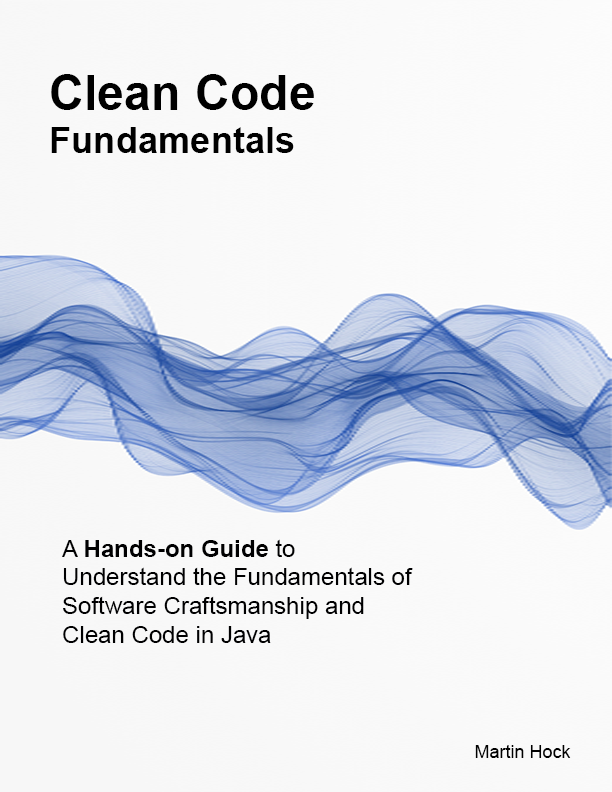
This book is for sale at http://leanpub.com/clean-code-fundamentals
This version was published on 2021-06-20
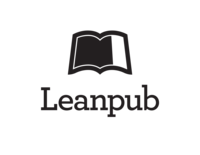
* * * * *
This is a Leanpub book. Leanpub empowers authors and publishers with the Lean Publishing process. Lean Publishing is the act of publishing an in-progress ebook using lightweight tools and many iterations to get reader feedback, pivot until you have the right book and build traction once you do.
* * * * *
Bad code is like a joke, if you have to explain it, it is bad.
This is a Forever Edition. That means that this book will see periodic updates.
If you purchased this book, thank you very much! Writing a book like this takes some hours of effort. Please treat your book as your own personal copy and do not redistribute the book without authorization.
If you find this book useful, I would greatly appreciate you purchasing a copy. By doing so, youll be letting me know that books like this are useful to you.
Readers of this book will acquire in-depth knowledge and skills for the analysis, assessment and improvement of software quality. You will be able to apply principles, patterns, techniques and tools needed to write clean code.
Understanding important concepts of software quality in Java projects:
- Best Practices
- Functional and technological scope
- Development and programming models
- Tools
Learning Objectives:
- Acquisition of knowledge and skills to analyze, assess and improve software quality
- Learning principles, patterns, techniques and tools
- Deeping technology knowledge
Software testing is not limited to a specific phase of a project. Already during the coding phase or the build process, critical and difficult to find software defects can be detected in the source code. The necessary procedures and tools are presented in this book.
Among other things, the following topics will be covered:
- Overview of the basics of software quality
- Software metrics, metric application in practice
- Structured design, cohesion and coupling
- Overview of Principles, Best Practices and Code Smells
- Compliance and verification of Java code conventions
- Static software testing, especially review techniques and static program analysis
- Ensure software quality with tools such as SonarQube, PMD, SpotBugs, Checkstyle, ArchUnit and Dependency-Track
- Software tests with JUnit and Mockito
- Checking the test code coverage
- CI/CD
- Design Principles
- Design Patterns (GoF)
I wrote the book, because I want to help developers getting experience in clean code or improve it. Get them a feeling what it is about to be a Software Craftsman. It is about Professionalism, Pragmatism and Pride!
Its a mindset, where software developers choose to be responsible for their own careers, learning new tools and techniques and constantly getting better. The journey to a Software Craftsmanship is a long one.
That`s why I wanted to share some techniques and practises for improving code quality and motivate developers.
- Developers are always wrong - only the degree to which different developers are wrong in their endless architecture discussions differs!
- If something can break, it will break - make sure that a project is fool proof!
- All code is bad - there are only gradual gradations of the defectiveness of a piece of software!
- There is always a bug somewhere - you just must search long enough!
- The most important thing is the customer - and they dont give a damn about the technologies and processes used!
- Project development on paper does not work - problems are only identified during the development process!
- Less is more - if something is not necessary, just leave it out!
- Only 20% of our work consists of coding - the rest is designing, debugging, testing, meetings, discussing etc.
- The customer never knows what he wants - everyone has only a vague idea of the desired result!
- Someone has done it before - dont reinvent the wheel!
All the code examples in this book are in Java. I don`t want to put much boilerplate code within the code examples, so I just leave it out.
Class names, data types, method and function names and code are not included in proportional font.
Schneider, Kurt: Abenteuer Software Qualitt Grundlagen und Verfahren fr Qualittssicherung und Qualittsmanagement, dpunkt.verlag, 2007
Robert, Martin: Clean Code A Handbook of Agile Software Craftsmanship, Prentice Hall, 2009
Lilienthal, Carola: Sustainable Software Architecture. Analyze and Reduce Technical Debt, Dpunkt Verlag, 2019
Bloch, Joshua: Effective Java Third Edition, Addison-Wesley, 2017
Roock, Stefan: Refactorings in grossen Softwareprojekten, Dpunkt Verlag, 2004
Gamma, Erich: Design Patterns: Elements of Reusable Object-Oriented Software, Addison-Wesley Professional, 1994
Robert C. Martin: Agile Software Development: Principles, Patterns and Practices, Prentice Hall, 2003
Bugayenko, Yegor: Elegant Objects Volume 1, CreateSpace Independent Publishing Platform, 2016
Bugayenko, Yegor: Elegant Objects Volume 2, CreateSpace Independent Publishing Platform, 2017
Harrer, Simon: Java by Comparison: Become a Java Craftsman in 70 Examples, OReilly UK Ltd., 2018
Robert, Martin: Clean Architecture: A Craftmans Guide to Software Structure and Design, Prentice Hall, 2017
Robert, Martin: The Clean Coder: A Code of Conduct for Professional Programmers, Prentice Hall, 2011
David, Thomas: Pragmatic Programmer special 2nd, Addison-Wesley Professional, 2019
Kaczanowski, Tomek: Practical Unit Testing with TestNg, 2012
Meszaros, Gerard: xUnit Test Patterns, Addison-Wesley, 2007
Long, Fred: Java Coding Guidelines: 75 Recommendations for Reliable and Secure Programs, Addison-Wesley Professional, 2013
Sandro, Mancuso: The Software Craftsman: Professionalism, Pragmatism, Pride, Pearson, 2014
Freeman, Steve: Growing Object-Oriented Software, Guided by Tests, Addison-Wesley, 2009
If you have anything to say about this book, Id love to receive your feedback.
Found a typo? Discovered a code bug? Have a content suggestion? Let me know and be a part of this book by providing feedback.
For contributions, please always tell me the chapter name, heading reference, and a brief snippet of text as a reference.
Font size:
Interval:
Bookmark:
Similar books «Clean Code Fundamentals»
Look at similar books to Clean Code Fundamentals. We have selected literature similar in name and meaning in the hope of providing readers with more options to find new, interesting, not yet read works.
Discussion, reviews of the book Clean Code Fundamentals and just readers' own opinions. Leave your comments, write what you think about the work, its meaning or the main characters. Specify what exactly you liked and what you didn't like, and why you think so.

